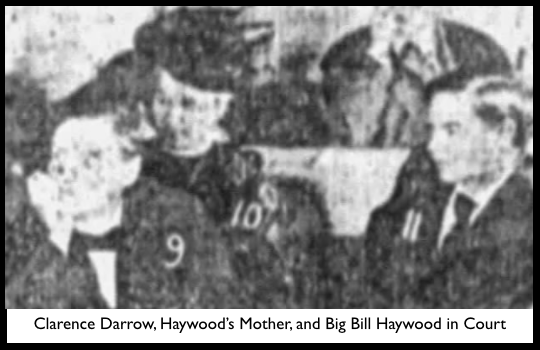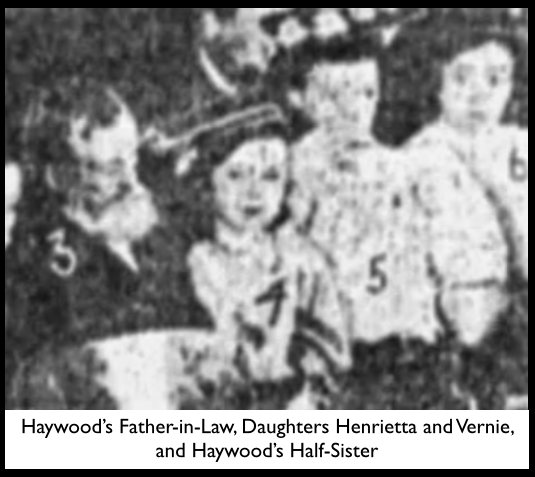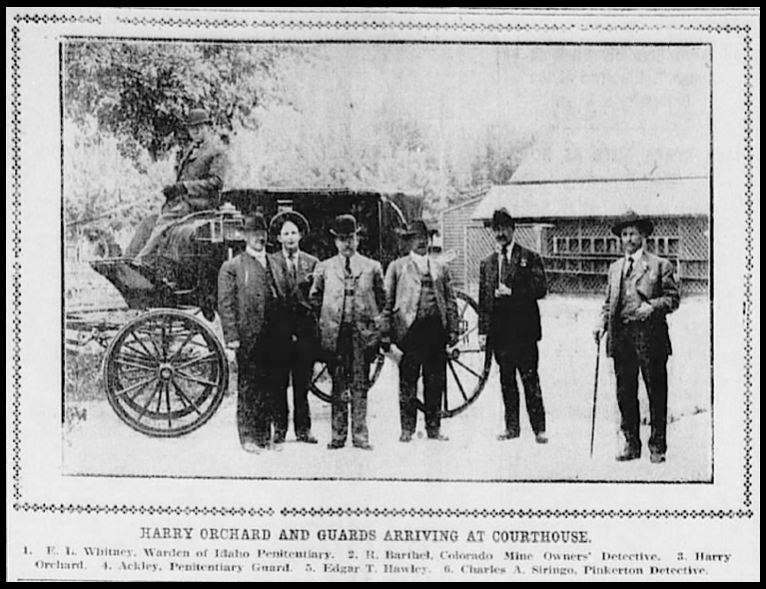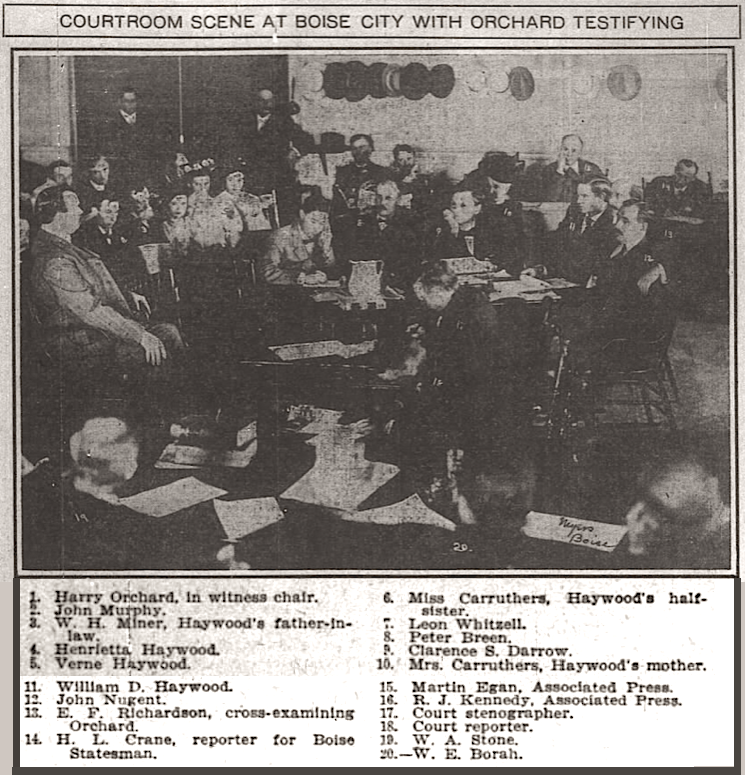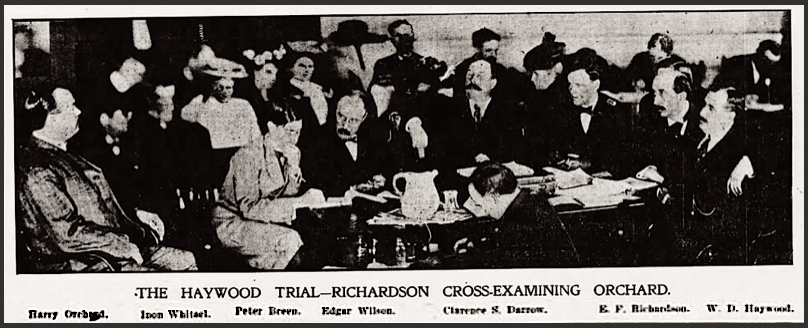There are no limits to which
powers of privilege will not go
to keep the workers in slavery.
-Mother Jones
Hellraisers Journal, Saturday June 15, 1907
Boise, Idaho – Haywood Family Attend Murder Trial
In this week’s edition (June 13th) of the Socialist Montana News, Ida Crouch-Hazlett describes the family members of Big Bill Haywood who sit in regular attendance at the trial of the Secretary-Treasurer of the Western Federation of Miners, charged with conspiring to murder the ex-governor of Idaho. Harry Orchard has been on the stand telling his tale of murder and mayhem and accusing the leaders of the W. F. of M. of directing him in his trail of villainy (see below).
The Haywood Family in Court:
Mrs. Steve Adams and Mrs. Pettibone attend court together-two handsome women, handsomely dressed. Mrs. Moyer’s sister is usually with them, a charming and dainty young girl. Mrs. Moyer has not yet appeared in court. Haywood’s mother, Mrs Caruthers, has arrived from Salt Lake with her daughter, a very pretty young girl of about twenty. The mother is a handsome women who carries herself well, and has a sweet expression on her face. They do not seem unduly agitated over the situation. They are upheld by the idea that it is all simply the part of a play in a great conspiracy.
The Haywood family are in court every day. Mrs. Haywood’s father, Mr. Miner, is here from Nevada, also Mr. McKinon, one of the Federation boys, who married her sister Winnie.
[Photographs added.]
The Star Witness, Harry Orchard, Testifies:
McParland’s Student
—–Orchard, the Star Witness,
Recites His Piece-
Escorted From Penitentiary
by Warden’s Family
—–
Boise, June 6.
Tuesday evening, with the utmost secrecy and care, Ochard was brought in from the state penitentiary and lodged in Attorney Hawley’s law office where he passed the night on a leather lounge. He was driven into town in a two-seated carriage, himself and Mrs. Warden Whitney occupying the rear seat, and the warden and his daughter sitting in front. The warden was armed with a short-barreled rifle.
Behind him came another carriage containing a number of guards who with other officers guarded the building all night long.
The entry into court of the murderous villain who has been held in the state penitentiary a year and a half for his many crimes, was dramatic.
The morning papers had spread throughout the town the news that he bad been brought in the night before, and the court room was jammed.
After the other witnesses had testified there was a lull of some ten or fifteen minutes, and then Harry Orchard was called. He entered the court room with guards before and behind him, expert gun-men, the thugs of the northwest. Jack Meldrum wan one, ex-convict, with his conscience only knows how many murders to his name. He took up his stand In the main doors where three other guards were stationed. The court room made one think of a military siege. All the entrances were double guarded. Two brawny guards sit at the railing gate immediately behind Orchard, and immediately beside two dangerous socialists, your correspondent on the one aide [Montana News editor, Ida Crouch-Hazlett], and Appeal Shoaf [George Shoaf of the Appeal to Reason] on the other. Orchard passes through the crowd with a rapid step. Perhaps he has acquired the habit of thinking that delays are dangerous.
Odd or freakish looking persons were searched before being allowed in the court room. All packages were searched and taken away. Even the bag of Wade Parks [of the Industrial Union Bulletin-I. W. W.] was confiscated, and he was not allowed to enter the court room with it.
Orchard looks neat, well dressed in gray and well kept. But his face is certainly one of the most repulsive countenances that one is ever called to gaze upon. It is the face of a man without a soul, of one who has never known the call of the higher and nobler impulses. He is a man who would do anything for almost any consideration. He is of the born criminal type—with a certain intelligence to enable him to carry out his crimes, but not enough to enable him to successfully cover them up.
He bore a certain tremulous aspect at first as though be realized the unusual and abnormal role he was about to assume.
Haywood eyed him intently when he entered and during his entire testimony.
The capitalist papers take great delight in spreading around how nervous Haywood is, and how the testimony is visibly affecting him. Such reports are entirely untrue. He is calm and self-possessed, consults constantly with his attorneys, and shows no signs of flinching whatever. He is a little pale and worn from the long ordeal, and that is all. And he certainly is not shivering before Harry Orchard.
Orchard’s testimony was simply a repetition of what has already been published as his confession, and which he repeated as one who had learned a lesson well. Hawley led the way for him with questions—so much so that Attorney Richardson accused him of testifying instead of the witness. He said his real name was Albert Horseley, and that he was born on a farm in Colorado.
He told about coming to Idaho, working in the mines at Burke, joining the Federation, assisting in stealing a train during a strike there and blowing up the Bunker Hill and Sullivan mill, under the instructions of W. F. Davis, a union official.
After this the troops were ordered into the Coeur d’Alenes.
In telling his tale Orchard stated that since Steunenberg had been elected as the “peoples” governor, the miners believed that they would have no opposition from the governor and only need fear the federal authorities.
Orchard then wandered around the the country for a number of years working first here, then there like the rest of the working class. As he told of his wanderings as a wage slave one could trace the economic cause for his lapsing into well-paid crime. It was easier and more interesting than working.
He told of working in the Cripple Creek district, and of his plans with Federation officials to commit numberless crimes. How he was offered $200 to blow up the level of the Vindicator mine where the scabs were working and how the superintendent and boss were killed; of the arrangements for paying the money over; how he quit working and devoted himself to deeds of darkness. He implicated numbers of Federation men, telling continually of the orders he received from Mover and Haywood.
He told of wrecking a Cripple Creek train, and it was hard to get his money for the job, so he divided to turn informer, and went to D. C. Scott, the famous detective employed by the railroad. This man is one of the greatest scoundrels that ever hounded the work ing class.
Then came the stories of the plots of Moyer, Haywood, Pettibone, Simpkins, Orchard, Steve Adams and others to kill Governor Peabody, and of the manufacturing of bombs in Pettibone’s store; of how Orchard and Adams killed Lyle Gregory, a detective; how they blew up the Independence depot; how he went to California and blew up Bradley who was president of the company in the Coeur d’Alenes during tile trouble. The gruesome tale then went on to tell of attempts on the lives of Judges Goddard and Gabbert in Denver, giving as a reason that as these men returned decisions against the working class, and they could get no justice they must take the law in their own hands.
Details were gone into as to the making of bombs, and one of the infernal machines was presented as an exhibit. And then the tale came down to the Caldwell affair, varying no whit from what has been published.
One of the assertions made was that Dave Coates proposed the kidnapping of one of August Carlson’s children, and said a large sum could be realized that way.
Another was that the Federation ring proposed to kill Steunenberg, and then send a man back to Patterson, New Jersey, the anarchist stronghold, to write threatening letters to others high in authority.
Orchard was a day and a half giving his testimony. The performance was a psychological study. The man has woefully missed his calling. He should have been a second Conan Doyle. Sherlock Holmes isn’t in it beside him.
The defense took him for cross examination about the middle of Thursday afternoon.
Mr. Richardson brought out that he was a bigamist, changed his name the first time he left home, deserted his own wife and child, and ran off with another man’s wife. He admitted be told a string of lies to Pettibone about his antecedents.
—–
When one reads the testimony of Orchard, how he claims he murdered for money, the question arises, How much is he being paid to railroad Moyer, Haywood and Pettibone to the scaffold?
———-
[Photographs added.]
SOURCE
Montana News
“Owned and Published by the
Socialist Party of Montana”
(Helena, Montana)
-June 13, 1907
http://chroniclingamerica.loc.gov/lccn/sn84024811/1907-06-13/ed-1/seq-1/
IMAGES
HMP, Haywood’s Mother in Crt, NY Binghamton Prs, June 21, 1907
HMP, Haywood’s Family in Crt, NY Binghamton Prs, June 21, 1907
https://www.newspapers.com/image/252540586/
HMP, Orchard To Court, DEN, June 13, 1907
https://www.newspapers.com/image/73736313/
HMP, Courtroom Scene, Ipls Ns, June 13, 1907
https://www.newspapers.com/image/37278806/
HMP, Def Atts, R. Crosses O., WDC Eve Str, June 14, 1907
https://www.newspapers.com/image/215075392/
See also:
Haywood Trial-Darrow Collection
http://moses.law.umn.edu/darrow/trials.php?tid=3
Trial Transcripts, June 4-7
Note: pdf, slow to load.
http://moses.law.umn.edu/darrow/documents/VOL_1_HAYWOOD_TRANSCRIPT_PP_1_504.pdf
Bill Haywood’s Book
The Autobiography of William D. Haywood
-by Big Bill Haywood
International Publishers, 1929
https://catalog.hathitrust.org/Record/000859708
See Chapter XIII-The Boise Trial
https://babel.hathitrust.org/cgi/pt?id=mdp.39015050276461;view=image;page=root;size=100;seq=211;num=207

